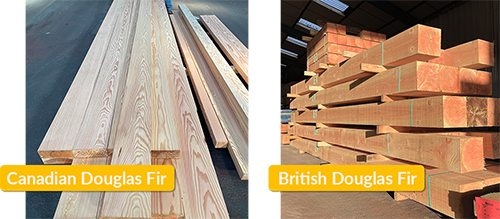Articles: Using British Softwood for your joists
One question the team is commonly asked is if British softwood, your Larch, Douglas Fir and Cedar are suitable to be used for joists? With them being so cost effective we can understand the query!
See, thing is, we can keep the costs of British softwood so competitive because not only is it locally sourced from luscious English forests, it is also freshly cut straight from the log which means minimal waste and complete size flexibility.
So, they’re well priced, are they up to the task of joists? Yes, absolutely. For starters, all of our British softwood is appearance graded to ‘Fresh Sawn Merchantable’ grade as standard which equates to a strength class of C14 or better. For higher grades, please get in touch.
Why use iWood British Softwood over general builders merchant softwood?
If you’re looking for joists you’ll most likely have come across builders merchant options that are available. Whilst you’re limited to stock sizes they provide, they’re usually very cost effective and functional option.
For a step-up from that, this is where iWood’s British softwood shines. Yes it is slightly higher in price but, where the cheap and cheerful aspect of builders merchant timber can’t be denied, there’s something special about a freshly felled homegrown tree, cut to a bespoke order beam that has so much more appeal.
Moreover, you can expect theses freshly felled logs to be sourced from well managed forests which are harvested with care and consideration to keep woodland density to a maintain a perfect eco system.
Builders merchant timber may be FSC or PEFC certified but there are no guarantees of origin so it can be sourced from anywhere in the world. In addition, its common for these standard softwoods to be chemically treated to help achieve strength classification’s.
This will alter the chemical composition of the softwood and finish with a dull green colouration. It doesn’t exactly sell itself but it certainly has its place in the timber trade, iWood British softwood is the option that offers something more upmarket with great character and heritage behind it.
Do British timbers come from well managed forests?
Timber is a renewable material and when properly managed is one of the most eco friendly construction materials available on the market. Every part of the tree serves a purpose ensuring minimal waste and maximum utilization.
The main takeaway from the point above is - ‘when properly managed’. There are several organizations that have been created to govern how these forests are harvested to ensure properly managed forestry, organizations such as GiB (Grown in Britain), FSC (Forest stewardship council) and PEFC (Programme for the Endorsement of Forest Certification)
The latter are worldwide companies whereas GiB ofcourse is all about British timber certification. The GiB ethos resonates with iWood as a merchant and we support the cause in any way we can with our own GiB Licence as well as utilizing sawmills that source their logs from GiB certified forests.
Whilst certified timber isn’t better in performance compared to uncertified timber, buying well sourced timber ensures the longevity and functionality of British forests.
How do British timbers compare to imported softwood?

Imported softwood for one is more expensive than British softwood, particularly the clear imported softwood. Canadian Douglas Fir for example is up to 3x more expensive than British Douglas Fir as this article is written.
This price difference is down to a multitude factors, one of which is the aesthetic. Canadian Douglas Fir has a much lower knot content compared to the British and is supplied kiln dried. They are the same genus species at their base but the different growing conditions produce a different appearance.
Imported timbers also tend to have a lower moisture content which makes them more stable and less prone to moisture movement.
For a more specific comparison of British timbers, check out this page: Are British Timbers Different?
Do British softwoods come in C16/C24 grades?
Mentioned at the start of this article, standard fresh sawn merchantable grade British timber is a minimum of C14 grade but sometimes your builder or structural engineer will specify C16 or even C24.
For British timbers, C16 is very achievable and just requires our graders keen eye to ensure the beams meet the grade.
C24 however is a little different. Firstly they need to be a bit beefier and have a minimum thickness of 100mm or more, so your 50/75mm joists are off the table for C24 in homegrown softwood. Secondly, the cross section has to equate to 20,000mm2 which is simply the width multiplied by the thickness so it has to be 100x200mm for example.
Is British softwood dried?
In short, no. We talked earlier about the log sawn aspect of British softwood being one of its strengths to achieve a bespoke size so typically it is not stocked as dried.
The British softwoods we supply are all stable softwoods which are suitable for cladding and beams but not for internal use unless well prepared.
You can only use fresh sawn timber internally during the construction process where the materials will have a chance to naturally dry in the open air. Otherwise, it is best to allow the timber to dry after purchasing in a cool and dry location before installing into a centrally heated house.
Wrap Up: Benefits of British Softwood
We have looked at, cost, sourcing and application of British timbers but what else is there?
Amongst the plenty of reasons to use British timber, one stands out which many don’t consider. Being proud of your British heritage.
What better way to express this pride than to use materials grown here on UK soil, which in turn, support local businesses and organizations. From the sawmill, all the way up to the certification organizations like Grown in Britain.
Underscoring our words above, there are a variety of reasons to use British softwood and after reading this article you’ll have the right details and information to make an informed decision on if it’s the right product for you. If you’re still struggling to make a choice you can send an email in with your query, use the online chat or call us on 01889 597 281.







 Main Menu
Main Menu

